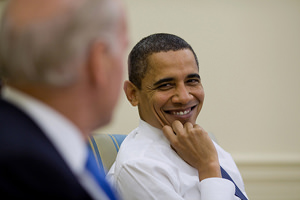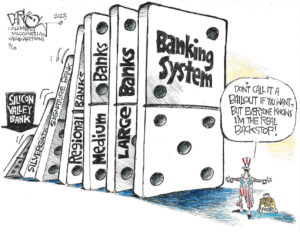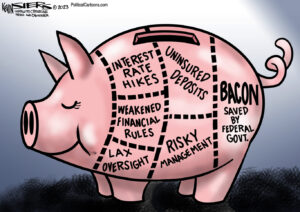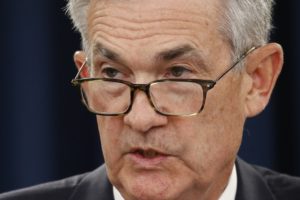The Occupy Windfall
"Defend Wall Street" is not likely to be a winning campaign slogan in 2012. For Republicans, this is an obvious problem. For President Obama and the Democrats, it's a golden -- if largely undeserved -- opportunity.
“Defend Wall Street” is not likely to be a winning campaign slogan in 2012. For Republicans, this is an obvious problem. For President Obama and the Democrats, it’s a golden — if largely undeserved — opportunity.
The biggest impact of the Occupy Wall Street protests has been to provide a focal point for generalized economic and political discontent. Frustrated voters on the left and the right may disagree on, say, immigration policy or health care reform. But they can agree on a critique of the financial sector — and, potentially, on specific measures to bring about necessary change.
No, Wall Street shouldn’t be made the scapegoat for all the nation’s woes. But it was the financial Masters of the Universe whose shocking irresponsibility and unbounded greed triggered the 2008 crisis, which almost sent the global economy into the abyss. We’re still dealing with the resulting devastation — massive unemployment, an epidemic of foreclosures, severe fiscal strain on governments at every level.
Wall Street, however, received a huge bailout from George W. Bush. Three years later, things are looking up in Lower Manhattan. Salaries and bonuses are climbing back to levels that gladden the hearts of Ferrari dealers.
It’s true that in the years before the crash, many Americans made what turned out to be unwise decisions. We spent money we should have saved, we bought bigger houses than our families needed, we took out too many student loans. But now we’re having to deal with the consequences of those poor choices — while the wizards of Wall Street smugly rebalance their portfolios, having benefited from what amounts to a free pass.
Enter the Occupy Wall Street protesters with their simple demand for “economic justice” — the right cause at the right moment.
Republicans initially overreacted, as if Karl Marx had risen from the grave. Mitt Romney was so flustered that he almost mussed his hair. House Majority Leader Eric Cantor, surveying the small protest encampments in New York and other cities, called them “growing mobs” that threatened public order.
Within a week, however, Cantor was backing away from that “mobs” characterization and acknowledging “a growing frustration out there across this country” about unemployment. I’m guessing he must have seen the Time magazine poll indicating that 54 percent of Americans have a favorable view of the Occupy protests — versus just 27 percent who have a favorable view of the tea party.
This week’s New Yorker has a laugh-out-loud cover illustration: Top-hatted bankers march down Wall Street, carrying protest signs that say “Keep Things Precisely as They Are,” “Leave Well Enough Alone” and “I’m Good, Thanks.” That’s the danger for Republican candidates. That’s what they risk sounding like.
Yet the leading GOP presidential contenders want to scrap the Obama administration’s modest Wall Street reforms. Perhaps they believe that giving the architects of the 2008 crisis more latitude and less oversight is a great idea. Most voters, I’m confident, will disagree.
So Democrats are cautiously embracing the Occupy Wall Street protests and adopting the demonstrators’ rhetoric — for example, emphasizing the gulf between the richest 1 percent of Americans and the remaining 99 percent. In remarks Sunday at the dedication of the Martin Luther King Jr. Memorial in Washington, Obama spoke of King’s commitment to economic justice.
If Democrats reap a political windfall from Occupy Wall Street, it will not be richly deserved. While it is true that they have been better than the Republicans on issues of economic fairness, that’s not saying much. Although Obama is disliked by many on Wall Street for his rhetoric about how “millionaires and billionaires” need to pay “their fair share” in taxes, the fact is that he decided not to seek fundamental reforms.
It is also a fact that Wall Street is a major source of campaign financing for both parties. At present, Wall Street donors are giving heavily to Romney — a money man by trade who once headed Bain Capital. In July, however, the Center for Responsive Politics reported that of the $35 million that had been collected this year by Obama’s top-tier fundraisers, one-third came from the financial industry. Apparently, animosity is no match for self-interest.
By calling attention to this unholy alliance of financial power and political power, the Occupy Wall Street protests struck a nerve. The Republican Party is trapped on the wrong side of this issue. Democrats should be moving boldly, not timidly, to claim the issue of economic justice as their own.
Eugene Robinson’s e-mail address is eugenerobinson(at)washpost.com.
© 2011, Washington Post Writers Group
Your support matters…Independent journalism is under threat and overshadowed by heavily funded mainstream media.
You can help level the playing field. Become a member.
Your tax-deductible contribution keeps us digging beneath the headlines to give you thought-provoking, investigative reporting and analysis that unearths what's really happening- without compromise.
Give today to support our courageous, independent journalists.




You need to be a supporter to comment.
There are currently no responses to this article.
Be the first to respond.